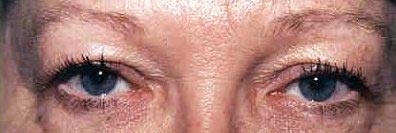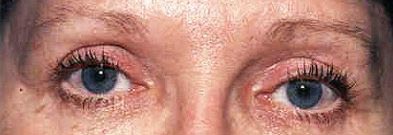Procedures: Eyelid Surgery
In addition to procedures to restore youthful vision, Pittsburgh Eye Institute offers cosmetic procedures to give the face a more youthful appearance. The area around the eyes is often the first part of the face to show aging, especially fine wrinkles, puffy lower lids, and droopy upper lids. Sun and wind damage and environmental factors take a toll on the skin’s surface. With eyelid surgery, we can make your face look years younger. The upper and lower eyelids, like all facial skin, become loose and saggy with age. The corrective surgery to counteract this is known as blepharoplasty. It can not only take years off your appearance, but, in the case of the upper lids, may improve vision.
For most people, the lower eyelid first becomes puffy with age and then begins to sag. To restore a firmer, more youthful appearance, Dr. Findlan can make a fine incision along the edge of the eyelid and remove excess fat and skin.
Sagging upper eyelids can not only add years to a person’s appearance, but can also make a person look tired or angry. In extreme cases, drooping eyelids can also interfere with vision. To remedy this, Dr. Findlan can make an incision that is hidden in the upper crease of the eyelid and remove excess skin giving the upper lid a smooth, rested appearance and removing it from the field of vision.
WHAT IS BLEPHAROPLASTY?
Blepharoplasty (pronounced blef’ah-ro-plas-te) is a type of plastic surgery that your ophthalmologist can perform on the upper or lower eyelids to remove excess skin and fat from around the eyes. Sagging eyebrows or eyelids may be corrected at the same time.
WHY IS BLEPHAROPLASTY DONE?
Blepharoplasty is done to improve visual function and/or cosmetic appearance. Excessive upper eyelid tissue can block the upper part of the visual field. This can be determined by lifting the upper lids with your fingers to see if the upper visual field improves or vision brightens. A formal visual field test may be helpful in this situation. The weight of the excess tissue may cause brow ache and fatigue. Occasionally the excess skin can cause eye lashes to turn in and irritate the eye.
An excessive number of wrinkled skin folds above the eyes can produce a sagging tired look which detracts from one’s general appearance. In this situation, blepharoplasty may be considered for cosmetic reasons even though vision is not affected. Cosmetic eyelid surgery is one of the most common plastic surgery operations performed by ophthalmologists.
WHY IS IT IMPORTANT TO CONSULT AN OPHTHALMOLOGIST WHEN CONSIDERING BLEPHAROPLASTY?
Because blepharoplasty can affect the function and lubrication of the eye, a consultation with an ophthalmologist is important. Although other surgeons may perform blepharoplasty, an ophthalmologist is the only surgeon trained specifically to treat the eye. Therefore, he or she is uniquely qualified to help you decide whether you should consider this surgery.
HOW IS EYELID SURGERY PERFORMED?
After the amount of skin and fat to be removed has been determined, upper and lower incision lines are marked along natural skin creases. Incision lines generally extend into the “crow’s feet” or “smile lines” at the outer edge of the eye, so that once healed, the incision lines are less visible. The excess skin and fat are removed, and the incisions are sutured closed. The procedure is-performed with local or general anesthesia depending on the individuals preference and health factors.
WHAT RESULTS CAN I EXPECT?
Generally results are successful. However, surgical outcome will depend on the extent of corrective work, the skin structure and healing process, hereditary factors, age and other physical characteristics. As with any surgical procedure, an element of risk exists. Hemorrhage, infection, or even blindness, though rare, may occur.
WHY ARE REGULAR MEDICAL EYE EXAMINATIONS IMPORTANT FOR EVERYONE?
Eye disease can strike at any age. Many eye diseases do not cause symptoms until the disease has done damage. Since most blindness is preventable if diagnosed and treated early, regular medical examinations by an ophthalmologist are very important. Why an ophthalmologist? Because only an ophthalmologist can provide total care for your eyes: medical, surgical and optical.
SCHEDULE A BLEPHAROPLASTY EVALUATION TODAY AT THE PITTSBURGH EYE INSTITUTE!


